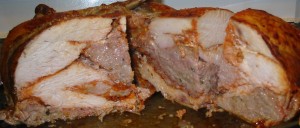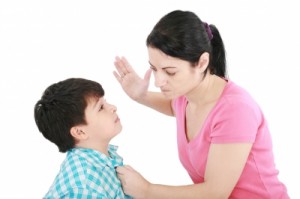I giggle every time I hear the word “Turducken.” I’m not entirely sure why. Maybe it’s the first four letters, or the “duck” (literally) in the middle, but Turducken references abound this time of year and I can’t help but chuckle every time I hear or read the word.
I’ve never even tasted Turducken, though I have tried Tofurky, and Turducken has got to be better than that. It’s certainly funnier, and not at all self-righteous. Still, I couldn’t help but wonder about the origins of this Thanksgiving delicacy, so I decided to do some research.
Turducken, for those of you that haven’t heard about this, is what you get when you take a chicken and stuff it inside of a duck, then you take that ducken and stuff it inside of a turkey.
In my head, I keep hearing Tevye from Fiddler on the Roof singing “Turducken, Turducken. Turducken!”
According to a 2002 New York Times story by Amanda Hesser, turkey found his inner duck (and chicken), “Once upon a time, possibly at a lodge in Wyoming, possibly at a butcher shop in Maurice, Louisiana, or maybe even at a plantation in South Carolina.” She wrote that “an enterprising cook decided to take a boned chicken, a boned duck and a boned turkey, stuff them one inside the other like Russian dolls, and roast them. He called his masterpiece Turducken.”
I guess chickdurkey and duchicky were already taken.
Of course these scenarios are certainly possible, as are the unsubstantiated claims that Cajun-Creole fusion chef Paul Prudhomme created the Turducken. But here’s the thing: all of these Turducken theories revolve around the idea that a man was the one who created the Turducken. I for one have never, in my 40-something year history of Thanksgiving celebrations, seen a man willingly move more than four feet away from any TV screening football games on Thanksgiving Day.
Therefore, it seems completely logical to me that a woman must have invented the Turducken.
Here’s my theory. You probably know the tune.
I Know An Old Lady Who Swallowed a Turducken (with apologies to anyone who can carry a tune or make a rhyme)
I know an old lady who swallowed a Turducken
I don’t know what kind of booze she was chuckin
She first bought a chicken
It seemed finger licken
But then in walked Chuck
He’d picked up a duck
The old lady sighed
With no room in the freezer
She’d have to cook both, to please the old geezer
She consulted Giada and Martha, her coven
They both told her simply to turn on the oven
She swallowed some wine, then swallowed some beer
What she did at this point isn’t perfectly clear
But then Rita showed up at the door with a turkey
The old lady took it; she didn’t want to be jerky
The oven then beeped it was ready to cook
How could the old lady get off the hook?
There was no way to fit three birds in her range
She had an idea, although it was strange
She’d seen a commercial a time long ago
Where peanut butter and chocolate did a Do-Se-Do
If Reese’s can do it then so can I
She gulped her martini and let out a sigh
Perhaps I’ll try.
And there you have the real explanation for how the Turducken came to be. Happy Thanksgiving!



